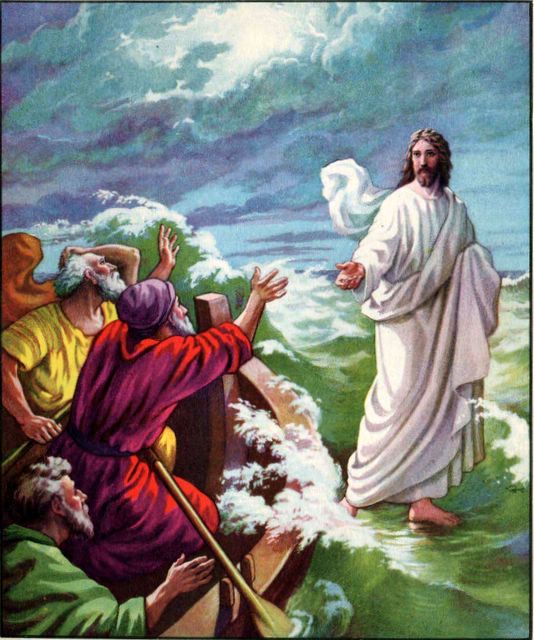Therefore when Jesus perceived that they were about to come and take Him by force to make Him king, He departed again to the mountain by Himself alone. Now when evening came, His disciples went down to the sea, got into the boat, and went over the sea toward Capernaum. And it was already dark, and Jesus had not come to them. Then the sea arose because a great wind was blowing. So when they had rowed about three or four miles, they saw Jesus walking on the sea and drawing near the boat; and they were afraid. But He said to them, “It is I; do not be afraid.” Then they willingly received Him into the boat, and immediately the boat was at the land where they were going (John 6:15-21).
The disciples cross the sea in a boat without Jesus. Jesus crosses the sea by miraculous means. He walks across the water. He comes near the disciples and they are frightened. One of the Evangelists records that they thought Jesus was a ghost.[1] But this is not ghost. It is a flesh and bone Jesus doing something that should not be possible. He speaks to the disciples to calm and reassure them. The NKJV[2] gives us, “It is I; do not be afraid.” The Greek is more telling. Literally translated, what Jesus said was, “I am. Do not be afraid.”[3] Jesus refers to Himself this way several times, and in significant situations. Theologians sometimes call these the “I AM statements”. At various times, Jesus says: I am the bread of life; I am the light of the world; I am the door; I am the Good Shepherd; I am the resurrection and the life. This passage doesn’t record one of those statements previously mentioned; Jesus uses this scandalous way of referring to Himself at other times too, like in this instance of walking on the sea.
Another famous time He used I AM to refer to Himself was also recorded by John. Jesus speaks to the Pharisees. They argue with Him about whether or not they are sons of Abraham (No, Jesus says they are sons of Satan) and whether or not they are slaves (Yes, Jesus says they are slaves to sin). At the climax of their interaction, Jesus says, “Most assuredly I say to you, before Abraham was, I AM.”[4] At this they were incited to murder Jesus but He, miraculously, passed by though the midst of them. Why such an uproar over Jesus’ grammar? Were the Pharisees such sticklers for proper Greek that an improper conjugation could earn you a rock to the face? No. In making the I AM statements, Jesus was claiming to be the Great I AM: YAHWEH, the God of Abraham, Isaac, and Jacob, in person, and in the flesh. That was a super big deal to the Jews.
When Moses fled to Midian after murdering the Egyptian, he tended sheep for his father-in-law. One day, while tending the sheep on Mt. Horeb, the Angel of the Lord appeared to Moses in a flame of fire from the midst of a bush. From this burning bush, the Second Person of the Trinity in His pre-incarnate form spoke to Moses: Come now, therefore, and I will send you to Pharaoh, that you may bring my people, the children of Israel, out of Egypt.[5] Moses tries to get out of doing this. His first tactic is to say that the Israelites won’t listen to him because he doesn’t know God’s name, and won’t be able to tell them when they ask. God’s reply: “I AM WHO I AM.” And He said, “Thus shall you say to the children of Israel, ‘I AM has sent me to you.’”[6] By applying God’s name to Himself, Jesus expressed the eternity of His being and His oneness with God the Father.
After arriving at the other shore, Jesus would declare to the people, “I am the bread of life. He who comes to Me shall never hunger, and he who believes in Me shall never thirst.”[7] Jesus left the previous day because the people wanted to make him king by force. Now He speaks to the crowds who seek Him, not because they believe, but because they ate of the loaves and were filled.[8] They see in Jesus a miracle worker who will give them all their earthly wants. They fear, love, and trust their bellies, just as we do. Jesus wants to give them the true bread from heaven - Himself, literally, His flesh. For the bread of God is He who comes down from heaven and gives life to the world.[9] Jesus is I AM in the flesh. He is, literally, Immanuel, which is translated, “God with us.”[10] He has come to save His people from their sins by giving His flesh.
[1] Matthew 14:26
[2] New King James Version
[3] Brown, Robert K., and Philip Wesley Comfort, trans. The New Greek-English Interlinear New Testament: A New Interlinear Translation of the Greek New Testament, United Bible Societies Fourth, Corrected Edition with the New Revised Standard Version, New Testament. Edited by J. D. Douglas. Wheaton, IL: Tyndale House Publishers, 1993.
[4] John 8:58
[5] Exodus 3:10
[6] Exodus 3:13-14
[7] John 6:35
[8] John 6:26
[9] John 6:32-33
[10] Matthew 1:23

No comments:
Post a Comment